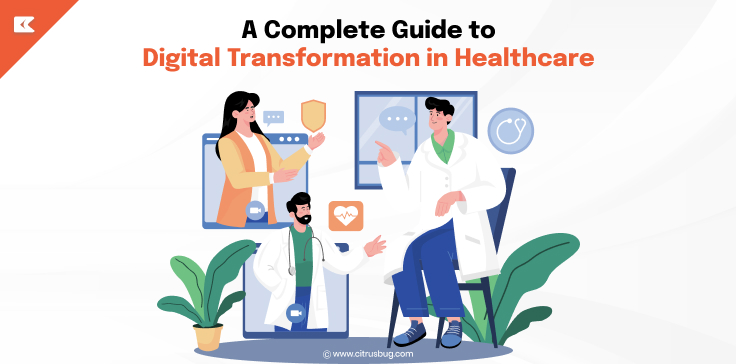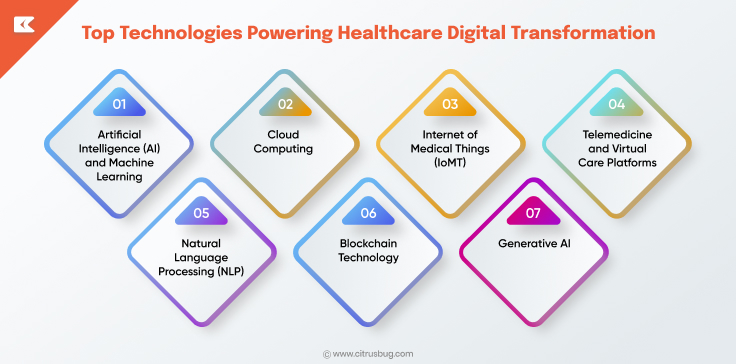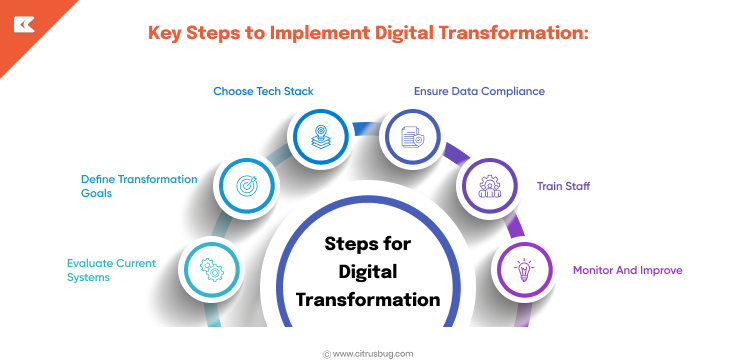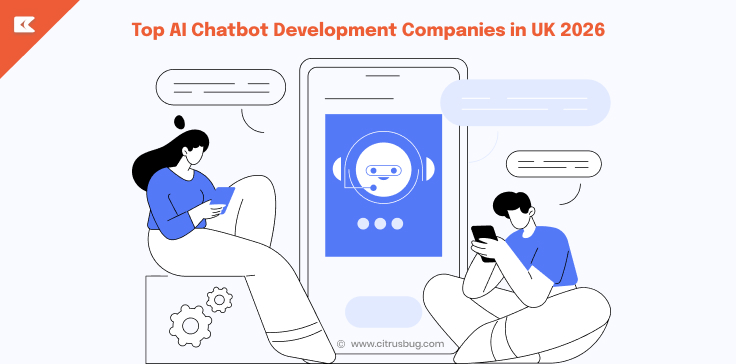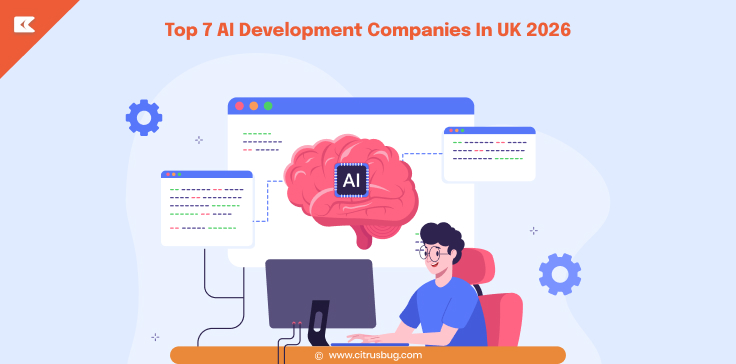A Complete Guide to Digital Transformation in Healthcare
- August 11, 2025
-
1357 Views
- by Ishan Vyas
Table of Contents
- What is Digital Transformation in Healthcare?
- Why is Digital Transformation Important in Healthcare?
- Benefits of Digital Transformation in Healthcare
- Top Technologies Powering Healthcare Digital Transformation
- Common Use Cases of AI in Healthcare
- Challenges in Healthcare Digital Transformation
- How to Successfully Implement Digital Transformation in Healthcare?
- Conclusion: Embracing the Future of Healthcare
Digital transformation in healthcare is more than just a trending phrase. It is impacting every aspect of healthcare delivery, including how care is provided and managed. With the current pace of technological innovations, as well as the increasing need for patients, there is a need for the adoption of digital technologies in healthcare to create a highly productive, easily accessible, and outcome-focused system.
In 2023, nearly 80% of healthcare executives reported increased spending on digital health tools in response to post-pandemic demands. Most of them are focusing on AI tools and telemedicine technologies. This guide covers the full scope of healthcare digital transformation, contemplating its relevance, the technologies that are enabling it, and its effective organizational execution.
What is Digital Transformation in Healthcare?
The term “digital transformation in healthcare” refers to the adoption of technologies such as Artificial Intelligence, Cloud Computing, Mobile Applications, and the Internet of Things for enhancing the quality of care, operational workflows, and engagement with patients. It is not only about records digitization, but it shifts the provider-centric care paradigm to a more connected system and a data-centric approach to determine, treat, and manage health.
This change helps solve the problem of healthcare systems that need to address the issue of accessible and personalized care. As patients demand more access and immediate interaction with providers, healthcare introduces digital healthcare solutions and collaborates with AI healthcare consulting agencies to upgrade its services. Ultimately, the transformation in the healthcare industry enables a shift towards more intelligent technology, simplifying the processes of delivering care.
Why is Digital Transformation Important in Healthcare?
Digital transformation is becoming essential in healthcare. Traditional systems can no longer meet rising demands, while technology continues to improve care, efficiency, and outcomes. This is why it is important:
Improved Safety and Effectiveness
Enhanced technology offers real-time patient data access, AI-based predictive analytics, and tailored therapy tracks, resulting in improved responsiveness and precision.
Greater Accessibility and Convenience
Patients in rural or underserved areas are catered to by telehealth and mhealth services. Health services can now be provided 24/7 to improve patient satisfaction and participation.
Operational Efficiency and Cost Reduction
The automation and AI-based chatbots, along with cloud-based technologies, are reducing costs and saving time in the healthcare industry.
Real-Time Data and Predictive Analytics
Tracking and evaluating a patient’s vital signs is possible now because of AI and IoT devices. This early intervention strategy helps reduce emergency department visits and lowers the rate of hospital readmissions.
Compliance and Data Safety
The technology change opens new possibilities for healthcare service providers to put into practice solutions compliant with HIPAA regulations, thus protecting the patient’s data and the privacy of the healthcare relationship and communications. This also ensures regulatory compliance and data safety.
Assistance for the Customized Health Approach
AI-driven insights and big data analytics enable more accurate diagnosis and treatment tailored to individual needs, supporting the global shift toward value-based care.
The consideration of these aspects demonstrates that the digital transformation in healthcare is required not only for modernization, but to build a sustainable, patient-centered ecosystem.
Benefits of Digital Transformation in Healthcare
The adoption of digital transformation in healthcare industry provides numerous opportunities not only for patients but also for providers and healthcare organizations. Better care delivery leads to an increased ability to run operations. The following are the most important benefits:
- Enhanced Patient Experience and Involvement: Patients can now obtain important information and make significant decisions through mobile applications, virtual consultations, and even AI chatbots because of the recent changes in the field of digital healthcare.
- Improved Clinical Results: The use of AI programs and predictive analysis software helps a healthcare system to be able to act by facilitating more accurate early detection, organization of treatment, and management of illnesses. These tools make the decision-making process very smooth and free of complications by the provision of data-driven suggestions
- Increased Efficiency and Automation: Automation technologies aid in scheduling, billing, and medical documentation, consequently reducing the amount of staff workload. This decreased workload not only helps eliminate errors but also increases staff efficiency and decreases the amount of paperwork.
- Improved Data Sharing and Interoperability: The use of cloud technology and electronic health record (EHR) systems has greatly facilitated communication on both a cross-sectional and inter-facility level. Different medical practitioners now have simple access to a patient’s medical history, which improves healthcare delivery, collaboration, and long-term patient care.
- Stronger Compliance and Data Security: Advances in the digital healthcare industry can now incorporate stricter controls such as data encryption and role-based access controls, as well as comply with set regulations such as HIPAA, which completely protects sensitive information.
- Scalability and Innovation: Healthcare software development service providers help organizations build and scale by creating custom and future-ready platforms that support innovation.
The role of the digital transformation fits every aspect of the care ecosystem, and the reason modern healthcare has to be both high-tech and patient-centric.
Top Technologies Powering Healthcare Digital Transformation
When it comes to the digitization of the healthcare sector, the aspect of obtaining the technologies is essential. All these are improving the process of providing healthcare services and revolutionizing the experience of the patients and care providers. The most impactful technologies, which are transforming healthcare, are the following.
1. Artificial Intelligence (AI) and Machine Learning
AI in healthcare is transforming diagnostics, treatment recommendations, and operational workflows. Analyzing radiology images, the AI software can provide more accuracy and can reduce the lag time to reach a diagnosis. It is estimated that the application of AI in healthcare is expected to rise to 45.2 billion by 2026 due to the multiplicity of its uses in healthcare settings.
2. Cloud Computing
Cloud-based platforms allow patient information to be both securely stored and accessed by qualified personnel anytime. This helps improve telemedicine, collaborative care, remote care, as well as data analytics. Healthcare organizations are quickly adopting cloud-based digital healthcare solutions to improve telemedicine and remote care while managing operational costs.
3. Internet of Medical Things (IoMT)
Through remote smart monitors, wearables, and other IoMT devices, health providers can remotely track patient vitals and provide real-time updates. These devices aid in managing chronic diseases and greatly reduce the need for hospital visits.
4. Telemedicine and Virtual Care Platforms
In recent years, the telehealth market has witnessed an incredible surge, and that has only accelerated following COVID-19. With telehealth, healthcare professionals are able to serve their patients via video calls and e-triage, which improves accessibility and reduces the burden of long wait times. Many healthcare app development agencies offer user-friendly, compliant platforms for remote care.
5. Natural Language Processing (NLP)
NLP automates the creation of clinical documents and allows the creation of meaning out of unstructured medical records. As a result, healthcare providers can spend more of their time with the patients.
6. Blockchain technology
Blockchain allows storing electronic health records (EHR) in a decentralized and tamper-proof manner. This ensures trust and transparency. It is valuable in secure medical transactions, identity verification, and verification of consent, and in managing them.
7. Generative AI
Generative AI is a growing trend. Many companies now offer custom generative AI solutions for healthcare to simulate patient data, support drug discovery, and enhance patient engagement. This technology enables rapid, highly personalized innovation.
A combination of these technologies helps medical institutions to overcome outdated systems, enhance the quality of care delivery, and remain in compliance with the regulations. The process of selecting the appropriate combination of innovations that will guide a transformation process is critical, with the advice of a reputable health care software development firm.
Common Use Cases of AI in Healthcare
AI technology is advancing the healthcare industry by enhancing the patient experience, improving diagnostics, and streamlining clinical workflows in virtually all areas of healthcare.
- Medical Imaging Analysis- AI technologies enhance the understanding of essential elements in procedures like X-rays, MRIs, and CT scans. This helps in refining the speed and accuracy with which patients are diagnosed.
- Predictive Analytics– AI analyzes patient information and data with algorithms to assess and predict probable health challenges. This makes it possible to take action in good time.
- Natural Language Processing (NLP) – It enhances the operations and information systems of the healthcare institution by automating medical documentation and processing of clinical notes by using relevant information.
- AI Chatbots- Help patients with self-assessment of symptoms, scheduling and rescheduling of appointments, respond to general queries, thus improving patient interaction and lowering the administrative load.
Challenges in Healthcare Digital Transformation
Enhancing healthcare systems with technology is not straightforward. It often involves a change in infrastructure, workflows, and even mindsets. Compliance, cost-effectiveness, and innovation often create roadblocks. However, with the right backing and a clear understanding of healthcare and technology, change is easier and more sustainable with the proper guidance.
Key Challenges:
- Data Privacy and Security: Protecting the cross-section of a patient’s confidential information is a core ethical responsibility. Healthcare professionals have to follow laws like HIPAA, which requires healthcare systems to maintain privacy-protected information and limit access to core system safeguards.
- Integration with Legacy Systems: The older software and hardware can not be integrated with the new digital healthcare services. This greatly complicates and lengthens the integration effort.
- High Initial Investment: This is a problem that a lot of smaller healthcare clinics and networks face. This is primarily due to the high upfront healthcare services. This cost burden includes building a new infrastructure, training staff, and new technology.
- Staff Adoption and Training Needs: Adoption of new streams of workflows and processes can be difficult for several healthcare practitioners due to gaps in training, which can be a drag on adoption.
- Regulatory Complexity: Compliance, tracking, and governance in any digital adoption for a given region is regulated, and hence the laws are per territory, which makes the healthcare regulations for any territory peculiar.
- Data Interoperability: Gaps and differences in the technology and organizational structure of different units of the same healthcare institution, as well as other healthcare providers, hinder smooth information exchange.
Addressing these problems is vital to embracing all the digital transformation trends and creating an interconnected and integrated healthcare system.
How to Successfully Implement Digital Transformation in Healthcare?
Incorporating digital innovations in healthcare is not as simple as embracing the latest technologies. Such innovations require thorough planning, engagement of appropriate stakeholders, precise evaluation of the clinical and operational frameworks, and guidance from seasoned health technology specialists.
Before moving forward, it is important to understand the current challenges and goals. This involves assessing workflows, looking for unnecessary steps, and pinpointing areas where digital health services could yield the most benefits. Involving important stakeholders from the beginning brings forward the adoption of clinically relevant insights, which help to deliver real, important value for patients.
An efficient AI healthcare consultant or a seasoned healthcare app development company can improve the transition process and help reach the desired outcomes.
Key Steps to Implement Digital Transformation:
Evaluate current systems
Start with a clear evaluation of current workflows, tools, and challenges. Identify where digital healthcare solutions can reduce inefficiencies and improve care.
Define transformation goals
Define success metrics, whether it’s reducing wait times, enhancing diagnostics, or automating admin tasks. Tie each goal to measurable KPIs.
Choose tech stack
Invest in flexible, secure platforms such as AI software, mobile apps, or cloud-based systems. For advanced needs, a Generative AI development company can support predictive tools and automation.
Ensure data compliance
Follow HIPAA or GDPR standards and implement strict data protection practices. Cybersecurity must be built into every layer of your system.
Train staff
Offer hands-on training to ensure staff understand and trust the new systems. A user-friendly design also encourages faster adoption.
Monitor and improve
After launch, gather feedback and performance data. Use it to refine systems, improve usability, and expand the solution gradually.
With the right strategy and support, digital transformation in healthcare leads to smarter systems, better care, and future-ready organizations.
Conclusion: Embracing the Future of Healthcare
Digital transformation in healthcare is vital for creating a more integrated, cost-effective, and patient-focused ecosystem. These include advanced diagnostic systems and health applications, mobile technologies, and encrypted electronic health records that allow operations to be performed in a smarter and lighter way. With rapid adoption, innovation is critical to meeting the digital healthcare requirements.
Citrusbug Technolabs partners with healthcare providers to build secure, scalable, and intelligent systems that support real transformation. As an experienced healthcare software development agency, we offer custom solutions backed by deep industry expertise. Ready to digitize your healthcare operations? Let’s build the future together.





 SaaS Development
SaaS Development Web Application Development
Web Application Development Mobile Application Development
Mobile Application Development Custom Software Development
Custom Software Development Cloud Development
Cloud Development DevOps Development
DevOps Development MVP Development
MVP Development Digital Product Development
Digital Product Development Hire Chatbot Developers
Hire Chatbot Developers Hire Python Developers
Hire Python Developers Hire Django Developers
Hire Django Developers Hire ReactJS Developers
Hire ReactJS Developers Hire AngularJS Developers
Hire AngularJS Developers Hire VueJS Developers
Hire VueJS Developers Hire Full Stack Developers
Hire Full Stack Developers Hire Back End Developers
Hire Back End Developers Hire Front End Developers
Hire Front End Developers AI Healthcare Software Development & Consulting
AI Healthcare Software Development & Consulting Healthcare App Development
Healthcare App Development EHR Software Development
EHR Software Development Healthcare AI Chatbot Development
Healthcare AI Chatbot Development Telemedicine App Development Company
Telemedicine App Development Company Medical Billing Software Development
Medical Billing Software Development Fitness App Development
Fitness App Development RPM Software Development
RPM Software Development Medicine Delivery App Development
Medicine Delivery App Development Medical Device Software Development
Medical Device Software Development Patient Engagement Software Solutions
Patient Engagement Software Solutions Mental Health App Development
Mental Health App Development Healthcare IT Consulting
Healthcare IT Consulting Healthcare CRM Software Development
Healthcare CRM Software Development Healthcare IT Managed Services
Healthcare IT Managed Services Healthcare Software Testing services
Healthcare Software Testing services Medical Practice Management Software
Medical Practice Management Software Outsourcing Healthcare IT Services
Outsourcing Healthcare IT Services IoT Solutions for Healthcare
IoT Solutions for Healthcare Medical Image Analysis Software Development Services
Medical Image Analysis Software Development Services Lending Software Development Services
Lending Software Development Services Payment Gateway Software Development
Payment Gateway Software Development Accounting Software Development
Accounting Software Development AI-Driven Banking App Development
AI-Driven Banking App Development Insurance Software Development
Insurance Software Development Finance Software Development
Finance Software Development Loan Management Software Development
Loan Management Software Development Decentralized Finance Development Services
Decentralized Finance Development Services eWallet App Development
eWallet App Development Payment App Development
Payment App Development Money Transfer App Development
Money Transfer App Development Mortgage Software Development
Mortgage Software Development Insurance Fraud Detection Software Development
Insurance Fraud Detection Software Development Wealth Management Software Development
Wealth Management Software Development Cryptocurrency Exchange Platform Development
Cryptocurrency Exchange Platform Development Neobank App Development
Neobank App Development Stock Trading App Development
Stock Trading App Development AML software Development
AML software Development Web3 Wallet Development
Web3 Wallet Development Robo-Advisor App Development
Robo-Advisor App Development Supply Chain Management Software Development
Supply Chain Management Software Development Fleet Management Software Development
Fleet Management Software Development Warehouse Management Software Development
Warehouse Management Software Development LMS Development
LMS Development Education App Development
Education App Development Inventory Management Software Development
Inventory Management Software Development Property Management Software Development
Property Management Software Development Real Estate CRM Software Development
Real Estate CRM Software Development Real Estate Document Management Software
Real Estate Document Management Software Construction App Development
Construction App Development Construction ERP Software Development
Construction ERP Software Development





